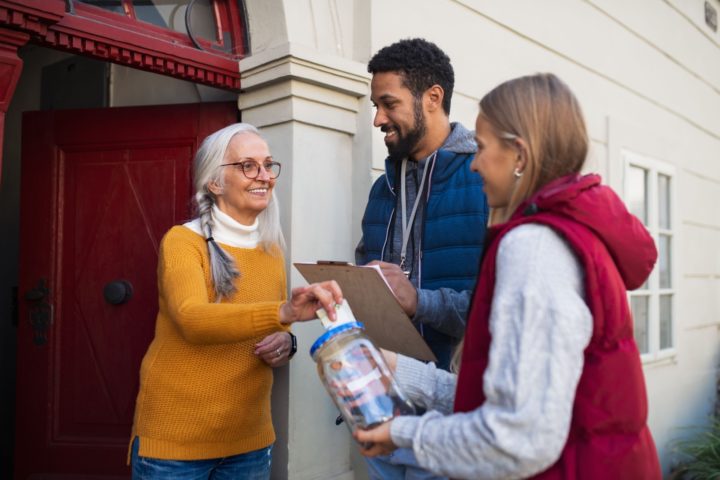Fundraising Donations
Overview
Introduction
There are a number of ways to fundraise from individuals. This resource will focus on regular giving, collections (including face-to-face fundraising) and lotteries.
As with all fundraising take time to think strategically about which methods are most appropriate for your organisations.
Consider who your target audiences are, how best to reach and inspire them to donate and what resources you have available or need to find to carry out your identified activities.

Fundraising legacies
There is a separate resource dedicated to Legacy Fundraising
As with all forms of fundraising, it’s important to make sure your fundraising activity complies with the Code of Fundraising Practice. This is particularly important where you are engaging with donors in public locations.
Read the relevant sections of the Code fully before embarking any fundraising activities. You also need to consider what additional permits and permissions might be required for your activities.
Regular Giving
Regular giving is often considered to be the holy grail of fundraising; reliable, regular unrestricted income that you can count on and budget in advance.
Many fundraisers use variations on the idea of the Fundraising Pyramid to think about how they can develop or ‘steward’ potential donors (ultimately anyone your organisation comes into contact with) into actual donors, and nudge them up the ladder to regular giving, major gifts and legacies.
Considering GDPR is very important throughout this process; you need to ensure that you are getting appropriate consent and giving notice to your stakeholders about how you use their data.
- Think about what opportunities you have to collect information about your potential and existing donors (for example at events). You can collect names and contact details from people who sponsor people fundraising for you (again ensure you comply with GDPR rules)
- Use a Customer Relationship Management system or create a GDPR-friendly database (this could be as simple as a spreadsheet) of your donors – people who have done a sponsored event for you, given a one-off donation or used social media platforms (such as Facebook and Instagram) to do birthday fundraisers etc for you. Or this could be people who regularly comment/share posts that you make. Such data can be resource heavy to collect, so consider what is the most effective use of the time you have.
- Keep a record of when you communicate, who communicated with them and what you communicate, what events they attend or donations they make. This helps consistency and avoids duplication which can simply annoy a prospective donor.
- If someone revokes their permissions for you to contact them, or requests only to be contacted by a specific method (e.g. text or email only), make sure this is recorded and adhered to.
- Think about how you can build relationships with your donors and gradually move them up the pyramid as appropriate. This could be mail outs to event participants to ask them to consider becoming regular givers, or even just leaving Direct Debit instruction forms at the end of your newsletter to give readers the option of becoming regular donors. Remind people of the impact their donation has and what the extra amount could bring
- Remember that people who already support you are far more likely to make a follow on/larger donation than a new contact. This is why it is so important to build a list of ‘warm’ contacts.
- As with all fundraising communications, it’s important that you have a good case for support to show your donors why they should donate, and the impact it will have on your beneficiaries. Case studies of specific individuals, with photos, helps bring the impact to life.
Collections
Health Warning: Charity collections give rise to much accidental and deliberate abuse, and it is essential that voluntary organisations take the greatest care when conducting any collection or employing others to undertake a collection on their behalf. You must make sure to adhere to rules and guidelines cited in the Code of Fundraising Practice when carrying out collections. Both your organisation and any third party carrying out collections on your behalf can be found in breach of the Code if any complaints are made.
What Is a Collection?
Street collections, house to house collections, collections on private premises, and static collecting boxes all come under the general heading of collections. There are a number of regulations (Primarily the Gambling Act 2005), special permissions and good practice, which apply to all collections. Collections can complement other fundraising activities, especially events, to maximise the income generated. For example, holding bucket collections or posting static collection boxes at events such as carnivals, sponsored walks, bike rides and concerts may encourage participants to give extra money. A minimum of 20% of the proceeds must go to the charity.
Some shops will allow you to leave collection tins on their premises. Ensure you collect them regularly, that they are securely fastened, and be aware that some break in occur where thieves target collection tins.
What Are the Benefits?
For many small voluntary organisations, holding a public collection is one of the most important ways in which they can raise unrestricted funds. The basic rules on collections:
- Permits – street and house to house collections require a permit (see below).
- Exceptions – you do not need a permit, but you will need the owner or landlord’s permission if you hold a collection:
- At events where there is a charge for admission.
- At venues such as cinemas, sports grounds, factories, churches, railway and bus stations.
- On other private premises such as public houses, offices and private shopping centres and schools.
- Non charities – you do not have to be a registered charity to conduct a collection; permits may be granted to other voluntary organisations at the discretion of the local authority.
Good Practice

Here are a few tips:
- Dates are important
- Unless you are working in partnership with a similar charity, avoid clashes with other collections because neither may do well (some local authorities licence only a few collections each year). Short winter days may not be a good time for door to door collections.
- Busy shopping days are popular with collectors so apply for your permit well in advance.
- Inform the police where and when you will be collecting – this is not essential, but it can help the police to prevent unauthorised collections.
- Volunteers – make sure you have enough people willing and happy to undertake collections; some volunteers don’t like the job, so find out how they feel and brief them well.
- Attracting donations – collectors are not allowed to rattle their tins or ask people for donations, but a costume or a uniform and friendly smile can do the trick.
- Limit the pain – don’t ask collectors to stand in the street for more than two hours; most people will only want a one hour slot.
- A base for collectors – try to arrange to have an office or shop as a base for street collections where collectors can pick up tins, permits and directions and drop off tins afterwards (this gives organisers better control and avoids having to round up stray tins).
- Make sure anyone working on your collection is wearing identification that shows they are collecting on behalf of your charity.
- Ensure all collection buckets/tins are properly sealed during the collection. Perhaps use themed tins to attract attention; for example a tin inside a fluffy dog for a dog charity collection.
- Provide Information – when undertaking street collections ensure you have information about your cause clearly visible on leaflets to handout. If people do not know about your work they are unlikely to make a donation.
- Choose your spot for collecting carefully, find high traffic areas, but also not where you will be congesting a pathway.
Permits
Permits can be obtained from the Licensing Officer of your local authority (county council). Remember, promoters can be prosecuted for failing to conduct a collection properly.
- Apply in good time (at least two months ahead, although some councils specify longer); the arrangements may be relaxed in exceptional circumstances such as disaster appeals, but don’t bank on it.
- The promoter must be a ‘fit and proper person’ – it is up to the authority to ensure this, and they may refuse to grant licences if they are not satisfied on this point.
- Information which must be provided by the sponsor includes:
- Promoter’s name and address.
- Name, address, objects (and registered charity number if applicable) of the benefiting organisation.
- Specific places and dates of the collection (which must be adhered to).
Care With Handling Money
The Fundraising Codes of Practice are available from the Fundraising Regulator and outline:
- Only use sealed tins for collections – open buckets are illegal.
- Collection envelopes should be sealed by the donor.
- No collector should open his or her tin or envelopes.
- The promoter or organiser should open the collection tins in the presence of the collector, and record the amount separately for each collector.
- Keep records of good sites and enthusiastic volunteers for future reference.
- And don’t forget to thank everyone who helped – they deserve it, and you may need them again.
Cashless Payments
Less and less people carry cash on a day-to-day basis. If you plan on carrying out collections regularly, or using static collection boxes as a regular source of income, it’s worth researching and investing in contactless donation boxes. (e.g. those that work on card/phone transactions). At a minimum have s QR Code that people can scan to make a payment by phone via a website.
Gift Aid
Do remember to consider Gift Aid when you’re fundraising from individual donations. Gift Aid is a scheme that allows charities and Community Amateur Sports Clubs (CASCs) to claim an extra 25p from HM Revenue & Customs (HMRC) for every £1 donated by an eligible taxpayer. To qualify for Gift Aid, both the organisation receiving the donation and the donor must meet certain eligibility criteria.

Introduction to Gift Aid
For more information on Gift Aid see this resource.
Lotteries and Raffles
What is a lottery? A lottery is defined as “the distribution of prizes by chance where the persons taking part, or a substantial number of them, make a payment in return for obtaining their chance of a prize” (House of Lords criteria).
Lotteries are an extremely popular and potentially effective way of raising money. But the regulations are complicated enough to require careful study.
The term ‘lottery’ covers items such as lottery tickets, raffle tickets and scratch cards. Regulations for different types of lottery: Different regulations apply depending broadly on their scale and where the tickets are sold.
The distinctions which voluntary organisations need to be aware are as follows:
- Small lotteries (i.e. raffles) do not need to be registered, provided:
- Tickets are sold on the premises during, and as an incidental part of a charitable event (such as a bazaar, fête, dinner or dance).
- Expenditure on prizes is no more than £250 (but there is no limit on the value of donated items).
- No cash prizes are awarded.
- Private lotteries have no limits on the type or value of prizes, and you do not need to be registered, but a number of restrictions apply, including the premises on which they are sold.
- Society (public) lotteries – tickets can be sold in public places, but the lottery must be registered with the Gambling Commission or your local county council, and a number of restrictions apply.
Governance
Does your governing document allow lotteries? The first thing to check is whether your organisation’s governing document allows you take part in gambling. Some charities expressly forbid it, so bingo and lotteries could be out of the question. Remember it is possible to update your governing document (the process for which should be outlined in the governing document), especially if you have a good business case for running a lottery as an additional income stream; in 2018, Ty Hafan children’s hospice made over £2m from their Crackerjackpot lottery.
It is also worth considering having a policy within your organisation on the ethics of accepting donations.
Some General Restrictions and Regulations
Lotteries rank alongside public collections for the number of public complaints they provoke. Make sure you are in the clear:
- If the organisation is a registered charity the lottery ticket must say so under charity law (if you use cloakroom tickets it is acceptable to over stamp them with the charity’s name and number using a rubber stamp).
- It is illegal for anyone under the age of 16 to sell lottery tickets – so parent teacher associations should only send raffle tickets home with pupils in sealed envelopes addressed to the parents.
- If you sell lottery tickets in the street you must do so from a kiosk or booth.
- If alcohol forms part of the prize you must obtain appropriate liquor licences.
- Always check with the Gambling Commission before undertaking a raffle to help an individual – fundraising for individuals is not charitable, and could have tax and benefit implications.
Online lotteries
There are many companies that will run a lottery on your behalf or who players can play and their money (or a proportion of it) is donated to your charity. These lotteries can take away a lot of the administration of running a lottery and allow you to reach a much larger audience. However not as much of the money will go to your cause as the company operating the lottery will take a fee.
Further Guidance
Further guidance on statutory and regulatory matters can be obtained from the following organisations:
Fundraising Regulator – Code of Fundraising Practice (including sections on personal data and fundraising, raffles and lotteries, static collections and public collections)

